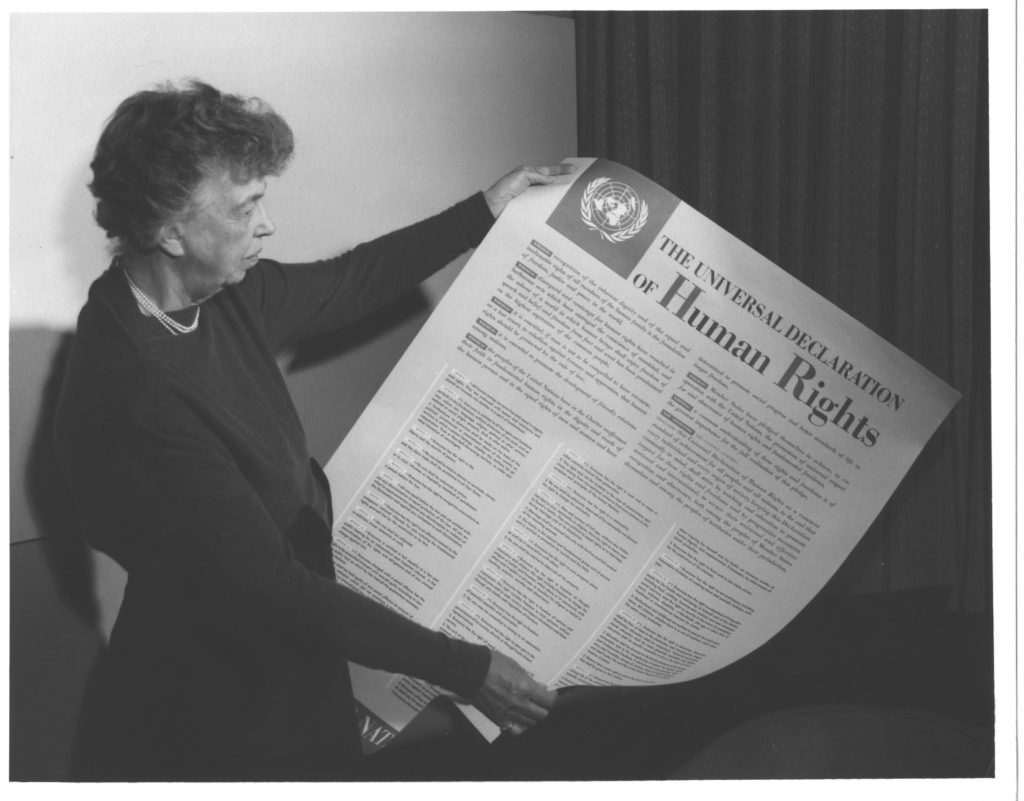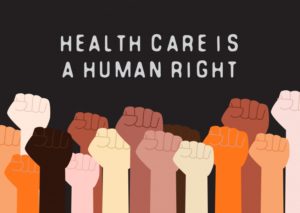Written by Stephanie Strand

More than 70 years ago, on December 10, 1948, the United Nations General Assembly adopted the Universal Declaration of Human Rights which proclaims, in addition to many other issues that reflect on human dignity:
“Everyone has the right to a standard of living adequate for the health and well-being of [their self] and of [their] family, including food, clothing, housing and medical care and necessary social services, and the right to security in the event of unemployment, sickness, disability, widowhood, old age or other lack of livelihood in circumstances beyond [their] control.”
Everyonehas the right to medical care, whatever the individual’s circumstances. Not “everyone with a job” or “everyone who can afford the co-pay” or “everyone in Congress.” Everyone, period.
The United States has a special relationship with the Declaration as Eleanor Roosevelt was Chair of the Human Rights Commission at the time and she was the driving force behind the document’s composition and passage. Ironically, however, the U.S. did not actually ratify the Declaration until 1992.
Today 12.4% percent of American adults have no health insurance, and tens of thousands of Americans die each year because they are uninsured. Millions more cannot afford adequate care because they are underinsured. Soaring drug costs are part of the problem. A recent study published in the journal Circulationfound that one in eight heart disease patients skips medication doses because of cost, and diabetic Americans are dying because skyrocketing drug prices force them to choose between insulin or food and shelter.
Medical debt is crippling American working families. Two-thirds of all personal bankruptcy filings cite illness and medical bills as contributing factors, and more Americans are being arrested and jailed because of outstanding hospital bills.
We are in the throes of a human rights crisis that’s been building for decades, and is only getting more urgent.
The problem isn’t that we don’t spend money on health care. In fact, we spend more per capita than any other industrialized country, by far. But so much goes to bloated administrative overhead, inflated prices for drugs and medical devices, profiteering, and waste that is unrelated to providing actual health care that even as we pay more we have worse outcomes than other wealthy nations on several measures, including infant mortality and maternal health.
In short, we witness human rights violations, millions of times over, through our current healthcare system.
What can we do? We can fight for Single Payer in Massachusetts. Single Payer will replace our current fragmented, disorganized, and expensive patchwork system of multiple private insurers and public agencies with a streamlined Health Care Trust that will cover preventive services and all medically necessary care for every resident. And bonus, it will cost far less than our current system.
If we’re willing to do the work, we can lead the nation toward health care justice.
Think about it. That Declaration belongs to every person. Everyone has an inborn entitlement to health care, simply for showing up. Are we willing to claim and defend this human right for all?


 Western Mass. Medicare for All (WMM4A) is pleased that an energetic primary season has now culminated in victory for several strong Medicare for All supporters almost certain to be elected to office on Nov. 6th. Single Payer healthcare was a key issue in the primary for many candidates and voters, discussed at public forums, and reported in the media.
Western Mass. Medicare for All (WMM4A) is pleased that an energetic primary season has now culminated in victory for several strong Medicare for All supporters almost certain to be elected to office on Nov. 6th. Single Payer healthcare was a key issue in the primary for many candidates and voters, discussed at public forums, and reported in the media. Merritt Hawkins is a physician recruitment firm. They did a study of physicians on 8/3/17, and the results were published in Newsweek of 9/19/17. The study found that 56% of American doctors they polled, were strongly or moderately in favor of a Single Payer healthcare plan here.
Merritt Hawkins is a physician recruitment firm. They did a study of physicians on 8/3/17, and the results were published in Newsweek of 9/19/17. The study found that 56% of American doctors they polled, were strongly or moderately in favor of a Single Payer healthcare plan here.